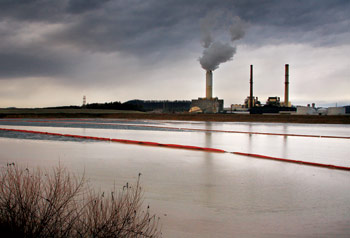[Editor's note: The massive coal-ash spill near Knoxville, Tenn., in December 2008 drew attention to the huge amounts of toxic wastes stored, with little regulation, at coal-burning power plants across (see The Green Scene, "One Lump or Two?" Jan. 14, 2009 Xpress). A report last fall that named Progress Energy's local dams potentially hazardous has kept this key issue in the spotlight. The following guest commentary presents author Rob Schofield's take on what the use of coal as an energy source means for North Carolina.]

North Carolina is ground zero these days in an important national debate over a critical environmental issue — namely, what to do with the mountains of ash and sludge produced by our numerous coal-fired power plants. Unfortunately, Gov. Bev Perdue's administration has weighed in on the wrong side.
Humans have been burning coal for centuries, but we've always known it was a nasty stuff. Not only has it always been incredibly dangerous to unearth, it's a huge contributor to global warming and a major contributor of toxins to the air we breathe and the water and food we consume.
Moreover, once you've burned the stuff, you're still left with a mess. In the United States, coal combustion produces nearly 140 million tons of waste — "fly ash," "scrubber sludge" and other combustion byproducts — each year. That's the equivalent of 1,400 aircraft carriers worth of ash and sludge.
For many years, most of the waste was simply left in place or discarded. Some of it, however, has actually been "recycled" for such seemingly beneficial purposes as landscaping and the production of wallboard and concrete. In North Carolina, the state Department of Transportation has used fly ash for road construction.
Unfortunately, in keeping with the increasingly apparent truth that there's no free lunch when it comes to coal, a growing body of evidence shows that, like the substance from which it emanates, coal waste is nasty and dangerous stuff.
Fifteen months ago, a dam containing a fly-ash "pond" in Tennessee collapsed, sending 1.1 billion gallons of slurry (an ash-and-water mixture) cascading into local rivers and onto local lands (including people's homes). North Carolina has 12 such dams — the most in the country.
Even more important than the risks associated with such disasters, however, is the toxicity of the stuff itself. Coal byproducts, it turns out, contain a host of incredibly noxious chemicals — arsenic, cadmium, lead, selenium and other toxics that cause cancer and brain damage in humans. Wherever this stuff is stored or "recycled," these chemicals can easily leach into the water supply and endanger surrounding communities.
In February, a national report brought to light the fact that 31 coal-combustion waste sites in 14 states are known to have contaminated ground water, wetlands, creeks or rivers. Five are in North Carolina, including sites in Arden (Buncombe County), Goldsboro, Moncure (Chatham County), Rocky Mount, Belews Creek (Stokes County) and Wilmington.
For all these reasons and more, the U.S. Environmental Protection Agency has been moving to reclassify coal combustion waste as a hazardous chemical (which should have been done long ago). This would require utilities to store the stuff more safely and greatly limit its application in products and other uses with a risk of human exposure.
Unfortunately, despite its past support for tougher coal-dam regulations, the Perdue administration is following the lead of the powerful electric-generation companies in opposing EPA action. The stated rationales are right out of the standard big-business playbook for defeating environmental-protection efforts — namely that such regulation would cost money, raise utility rates and inconvenience business.
Of course, there's a kernel of truth in these gripes. Protecting humans from environmental poisons usually does cost money — sometimes a lot of it — and can be inconvenient for businesses that were used to doing things a particular way. The same has been true hundreds of times before in the last 40-plus years as American regulators have struggled to limit the degradation of the natural environment and human health. If we'd let that stop us in the past, though, we'd probably be mourning the final demise of the ozone layer, have tens of millions of Americans struggling with lead poisoning, and might even be recovering from an American Chernobyl or two by now.
Ultimately, cost and inconvenience cannot be the deciding issues when large-scale human health is at serious risk. If coal waste is truly as toxic and dangerous as these reports indicate (one environmental expert recently described it as "the dirtiest waste that pollution-control devices keep out of the atmosphere"), then efforts to delay strong federal regulation are a terrible mistake and represent an extremely shortsighted step by the Perdue administration.
Let's hope the governor and her allies in the state's business elite come to understand this truth and rethink their position against strong regulation of coal waste before we all live to regret it.
Rob Schofield is the director of research and policy development at N.C. Policy Watch, a Raleigh-based nonprofit advocating social change.
A growing body of evidence shows that, like the substance from which it emanates, coal waste is nasty and dangerous stuff.


Before you comment
The comments section is here to provide a platform for civil dialogue on the issues we face together as a local community. Xpress is committed to offering this platform for all voices, but when the tone of the discussion gets nasty or strays off topic, we believe many people choose not to participate. Xpress editors are determined to moderate comments to ensure a constructive interchange is maintained. All comments judged not to be in keeping with the spirit of civil discourse will be removed and repeat violators will be banned. See here for our terms of service. Thank you for being part of this effort to promote respectful discussion.